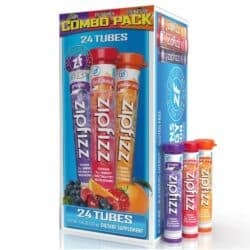Is Gatorade Zero Healthy (From a Nutritionist)?
Are you wondering whether Gatorade Zero is good for you or not? Find out the nutrition pros and cons of Gatorade Zero, plus some healthier alternatives you may wish to consider. For most people, Gatorade Zero is not healthy due to its highly processed ingredients, food dyes, and artificial sweeteners.

Gatorade Zero Facts
Gatorade Zero is a sugar-free sports drink made by PepsiCo for athletes and active people. The company website states that it replenishes electrolytes without the addition of sugar.
Gatorade Zero does not contain any of the eight major allergens, is caffeine-free, sugar-free, and contains around 5 to 10 calories per serving.
It is available in various bottle sizes and flavors, including Berry, Cool Blue, Fruit Punch, Glacier Cherry, Grape, Lemon Lime, Lime Cucumber, and Orange.
Some of the ingredients listed on the label are highly processed chemicals though, which makes it questionable whether this drink is healthy or a good option after intense exercise.
Some potentially unhealthy ingredients it contains include: Monopotassium Phosphate, Sucralose, Acesulfame Potassium, Glycerol Ester of Rosin, and various food dyes, depending on the drink’s flavor and color.
Gatorade Zero Ingredients
Gatorade Zero drinks have a long list of ingredients, many of which are chemicals.
The ingredient label includes:
- Water
- Citric Acid
- Natural Flavor
- Sodium Citrate
- Monopotassium Phosphate
- Modified Food Starch
- Glycerol Ester of Rosin
- Sucralose (Sweetener)
- Acesulfame Potassium (Sweetener)
- Color Additives (like Yellow 5, Blue 1, or Red 40 depending on the flavor)
Let’s examine some of the major ingredients listed on the nutrition label so you can help determine if this drink may have negative effects for certain health conditions or health issues.
Monopotassium Phosphate
Monopotassium Phosphate is a common additive found in processed foods and nutritional supplements. It is also used as a fertilizer. This additive consists of dietary minerals and is considered safe by the FDA.
Despite its reported safety, it’s essential to know that people with kidney disease, heart disease, or adrenal gland disorders may be adversely affected by this ingredient.
If you’re unsure whether Monopotassium Phosphate is safe to consume, it’s best to check with your healthcare provider to determine the potential risks.
Sucralose
Sucralose is a chemical used to replace sugar.
Despite FDA approval, many health-conscious people don’t consider Sucralose as a healthy ingredient due to various scientific studies.
This study revealed that consuming Sucralose long-term can cause toxicity and other health problems.
It can reduce good gut bacteria, which can harm the gut microbiome and cause it to stop working correctly. Sucralose also can cause inflammation and may contribute to obesity and diabetes.
If you choose to include this ingredient in your diet, it’s best to do so cautiously and consider avoiding using it long-term.
This ingredient is also in other leading sports drinks; see my related review of Powerade Zero.
Acesulfame Potassium
Also known as Acesulfame K, this artificial sweetener is 200 times sweeter than sugar and contains zero calories. Because of its bitter aftertaste, manufacturers often use other sweeteners like Sucralose or Aspartame with Acesulfame Potassium.
Acesulfame Potassium is a highly controversial additive. This study recommends further research to determine whether this artificial sweetener is carcinogenic and to rule out any other health risks associated with using it.
It’s important to note that even though the FDA has approved Acesulfame Potassium as a food additive, the organization recommends consuming no more than 15 milligrams per body weight per day.
It means that a person who weighs 132 pounds should consume at most 0.9 grams of the additive per day.
Glycerol Ester of Rosin
Glycerol Ester of Rosin is made from tree stumps of long-leaf pine trees.
Manufacturers add this food additive to food products and drinks as a thickener and stabilizer.
Despite minor problems with allergies, Glycerol Ester of Rosin is considered a safe additive. However, recent studies recommend further research to affirm this additive’s safety in terms of toxicity.
Artificial Colors
Gatorade Zero is available in different flavors and colors.
Depending on the variety, the drink contains Red 40, Blue 1, Yellow 6, or Yellow 5, and all have potential health risks. A
vital concern around artificial food colorings is the potential to cause allergic reactions, including hives and asthma. People prone to these reactions may be more likely to react to certain food dyes.
Let’s explore the artificial colors Gatorade Zero contains.
Red 40
This artificial color contains benzidine, a human and animal carcinogen. Despite this, the FDA presumes it is safe when consumed in smaller quantities.
However, this study established a potential link between red food dye and bowel disease, at least in mice.
Research like this study, and others, explore the connection between red food dye and Attention Deficit Hyperactivity Disorder (ADHD) in kids.
Based on scientific studies, there’s overwhelming concern that red food dye may not be safe to consume.
It can deplete minerals like iron and zinc, essential for development and growth. It causes chemical changes in the brain and can cause hypersensitivity, which causes inflammation and other allergic reactions.
It would be best not to consume this ingredient or use it with extreme caution, especially regarding children.
Blue 1
This study found that Blue 1 food dye can have genotoxic and cytotoxic effects.
Further examination revealed potentially serious adverse affects in both animals and humans.
Yellow 5 and Yellow 6
Like Red 40, Yellow 5, and Yellow 6 also contain the carcinogen benzidine, which the FDA presumes is safe in low levels. Yellow 6 also contains 4-amino-biphenyl.
It is up to you to decide if you feel comfortable ingesting artificial food dyes. At least one study found that Yellow 5 can cause DNA damage in blood cells.
Nutrition Pros
Gatorade Zero contains electrolytes that can help to replenish electrolytes lost during strenuous physical activity.
It is free from the top eight food allergens. It does not contain caffeine or added sugar and has very few calories, especially compared to original Gatorade.
The Gatorade Berry and Glacier Cherry flavors don’t contain artificial flavors, and the Berry flavor is sweetened with vegetable juice concentrate. The Glacier Cherry flavor is not artificially dyed.
Nutrition Cons
The ingredients in most varieties of Gatorade Zero include various processed chemicals, artificial sweeteners, and artificial colors, which may adversely affect health.
Even though Gatorade Zero is sugar-free and free from the main allergens, it is not necessarily sweetened by a healthy alternative. Sucralose and Acesulfame Potassium are both highly controversial ingredients with several health risks.
Lastly, this product is manufactured and sold in plastic bottles, which is not good for the environment and may expose consumers to microplastics.
Gatorade Zero Nutrition FAQs
Although some people may consider Gatorade Zero healthier than regular Gatorade because it doesn’t contain added sugar, it does contain various chemicals, including artificial sweeteners and controversial artificial food dyes Red 40, Blue 1, Yellow 5, and Yellow 6. In my opinion, Gatorade Zero is not healthy.
No, Gatorade Zero is only available in plastic bottles.
Yes, Gatorade Zero can help with hydration because it contains electrolytes. Better drinks without questionable ingredients to help with hydration include Cucumber Juice, Pineapple Coconut Water, Celery Juice, or even Ginger Lemon Water.
Yes, it is. It does not contain added sugar. However, it contains sugar-free artificial sweeteners Acesulfame Potassium and Sucralose, and both are controversial ingredients with potential health implications (see above article for more information about these ingredients).
It is not recommended. All Gatorade Zero flavors contain chemicals and artificial sweeteners that may cause adverse health effects. Some flavors also contain food dyes which are not recommended for children to consume.
Not necessarily. Even though this popular sports drink has less sugar than sugary drinks like sodas, it may not be good for weight loss and could even contribute to weight gain. This is because artificial sweeteners may “trick” the body and still mess with blood sugar levels.
If you are trying to lose weight, a better option would be stick with water as a healthier option for proper hydration. Or, choose an unsweetened coconut water that has only natural sugar content and is a suitable option for fitness enthusiasts needing electrolyte drinks (try my recipe for Pineapple Coconut Water as an example).
Don’t Miss These Product Reviews!
Conclusions
Gatorade Zero is a highly processed product that contains various chemicals. Even though it’s free from major allergens, caffeine, and sugar, it contains potentially unhealthy sweeteners and artificial coloring agents. If you choose to consume this product, it’s best to exercise caution and do so in moderation. Or, if you need additional electrolytes or energy drinks, make your own healthy sports drink at home using real food ingredients.
Don’t forget to join my newsletter list to get exclusive clean eating recipes and tips. The newsletter is 100% free with no spam; unsubscribe anytime.
About the Author: Carrie Forrest has a master’s degree in public health with a specialty in nutrition and is studying to be a holistic nutritionist. She is a top wellness and food blogger with over 5 million annual visitors to her site. Carrie has an incredible story of recovery from chronic illness and is passionate about helping other women transform their health. Send her a message through her contact form.
Note: this post is for informational purposes only and is not intended as medical advice. Please consult your healthcare provider for recommendations related to your individual situation.





















